The Congressional Medal of Honor (CMOH) honors the brave men and women who serve and protect our country. From Independence Day to Labor Day, Limited Edition Hero Cards will feature a different Medal of Honor recipient’s story of American heroism.
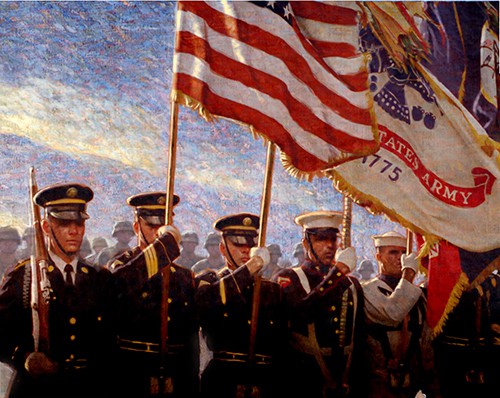
Medal of Honor History
First established in December 1981, the U.S. Senate authorized 200 medals of honor to acknowledge “gallantry in action and other seamanlike qualities during the present war (Civil War)” to recognize the merits of exceptional Naval officers. Originally produced to promote the Navy, today the Medal of Honor is bestowed to all three U.S. military branches including the Army and Air Force as well as the Marines and Coast Guard.
Each deserving CMOH recipient is a distinguished member of the military, awarded for
“action against an enemy of the United States,
…while engaged in military operations involving conflict with an opposing foreign force, or
…while serving with friendly forces….”
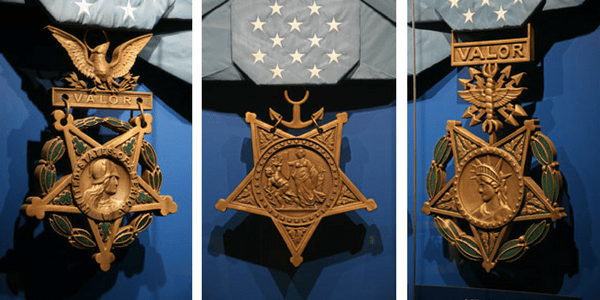
Distinguished Recipients
Since its establishment, nearly 3,500 Medal of Honor recipients have been recognized for great valor, gallantry and leadership while serving their country. Private Jacob Parrott of the U.S. Army received the first award on Mar. 25, 1863, for capturing a railroad train in enemy territory during the Civil War. The most recent Medal of Honor was made July 18, 2016 to Major Charles S. Kettles, who gallantly rescued an airborne infantry unit under heavy fire during the Vietnam War.
The following Heroes demonstrated selflessness and devotion to duty during various conflicts both domestic and overseas.
Week 6: Captain Roger Donlon
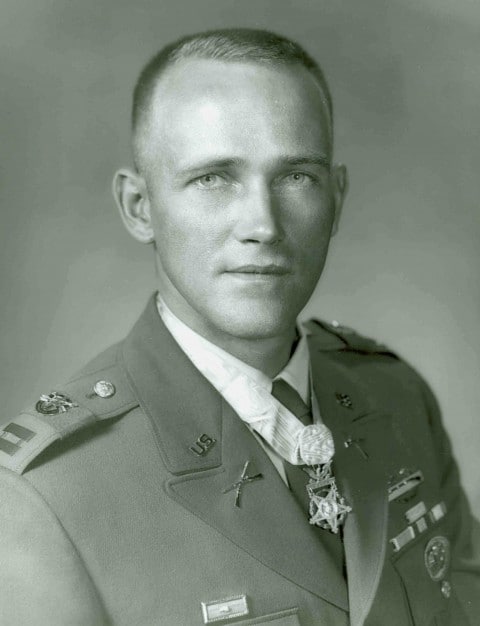
For his gallantry and patriotism, Captain Roger Hughes Charles (H.C.) Donlon became the first Medal of Honor recipient of the Vietnam War. He served as the commanding officer of the U.S. Army Special Forces Detachment A-726 at Camp Nam Dong, known as the Outpost of Freedom and considered a major victory for South Vietnam.
At 2:26 a.m. on July 6, 1964, Capt. Donlon was completing his predawn rounds when a battalion of 800 Viet Cong soldiers launched a full-scale attack on the government outpost manned by 12 Green Berets tasked with training 300 South Vietnamese and 40 Nung soldiers.
As he crawled from one bunker to another to move out weapons and ammunition, treat the wounded, and arm and encourage defenders, Capt. Donlon was repeatedly hit with shrapnel in the face, leg, shoulder and stomach but continued to direct defenses. Outnumbered 3 to 1 , the camp held against mortar, grenades and machine gunfire in the predawn for five hours straight. Enemy soldiers ordered the surrender of American soldiers over a loudspeaker, but Capt. Donlon and his unit refused to be captured, finally driving out the Viet Cong.
On Dec. 5, 1964, President Lyndon B. Johnson ceremoniously presented Capt. Donlon with a Medal of Honor, stating, “Let any who suggest that we cannot honor our commitment in Vietnam find new strength and new resolution in the actions of this brave man and his comrades.”
Capt. Donlon served for 32 years and retired as a colonel in Leavenworth, Kan.
Week 5: Captain Maurice L. Britt
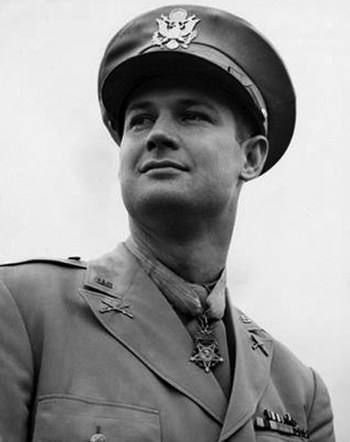
U.S. Army Capt. Maurice Lee “Footsie” Britt was a football star at the University of Arkansas and drafted by the Detroit Lions before entering service following the bombing of Pearl Harbor. He became the first to earn all three of the highest military decorations in the same conflict for his prowess and repeated acts of bravery in combat during the Allied invasion of Italy.
On Nov. 10, 1943, the 3rd Infantry Division resisted and survived an attack from larger German forces in Mignano, Italy, largely due to the fearless defense led by Capt. Britt, then a lieutenant.
Serving with the 3rd Infantry Division in the Allied invasions of North Africa, Sicily and Italy, Lt. Britt, then a lieutenant, led a tremendous counterattack against German forces in the Italian campaign at the risk of his life. The platoon commander successfully pushed back a larger German unit threatening to entrap his small battalion. Refusing medical attention until so ordered, Lt. Britt twice led by example, fighting ferociously through his bullet and grenade wounds to defend his men and free captured Americans. He continued to serve until Feb. 12, 1944, when he was severely wounded by an exploding artillery shell and lost his right arm.
The valiant army captain was awarded a Silver Star in 1943, and Distinguished Service Cross and Medal of Honor in 1944. He returned to the University of Arkansas to study law and was later elected Lieutenant Governor of Arkansas from 1966-1970.
Capt. Britt was laid to rest in the Little Rock National Cemetery on Nov. 26, 1995.
Week 4: Assistant Surgeon Mary E. Walker
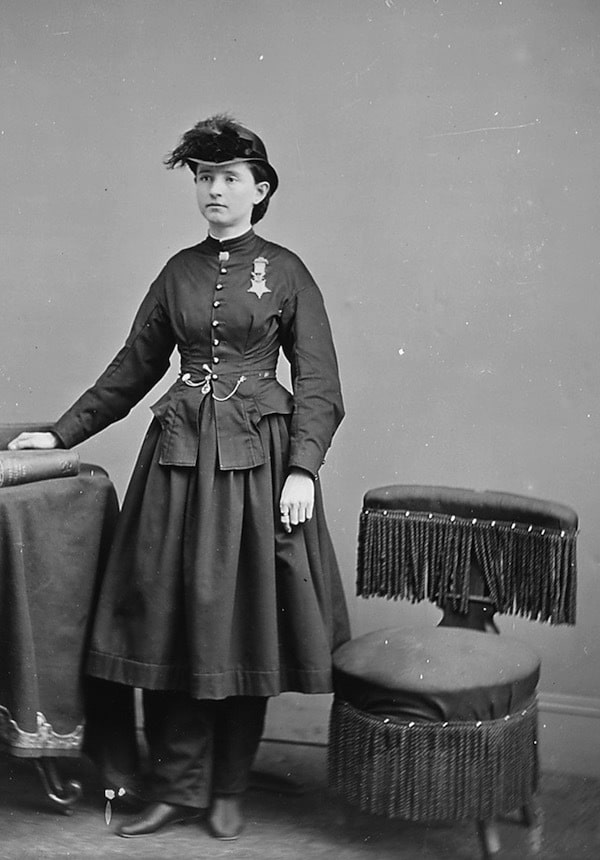
The first and only female recipient of a Medal of Honor, Contract Acting Assistant Surgeon Dr. Mary E. Walker fought her own personal battles against Army bureaucrats and Confederate captors to serve as a surgeon in the Civil War.
A graduate of Syracuse Medical College and one of the few women physicians in the U.S. at the time, Dr. Walker applied to the War Department for a commission as a Civil War Army Surgeon. After being rejected for being a woman, she volunteered her services and proved her worth at the Patent Office Hospital in Washington, D.C. Finally awarded a contract to serve as an assistant field surgeon, Dr. Walker treated severely wounded soldiers in various battles including the Battle of Bull Run, Battle of Atlanta and Battle of Chickamauga. Suspecting she was a Union spy, Confederate officers abused her as a Prisoner of War from April 10, 1864 to Aug. 12, 1864 until she was exchanged for a Confederate medical officer.
For her bravery under fire, the surgeon received recommendations from Major-Generals Sherman and Thomas. In lieu of a military commission, however, President Andrew Johnson bestowed Dr. Walker with a Medal of Honor for Meritorious Services, explaining that she “rendered valuable service to the Government, and her efforts have been earnest and untiring in a variety of ways.”
In 1917, the Board of Medal Awards revoked the honor from more than 900 recipients after revising standards to recognize only those who engaged in actual combat. Because of her civilian status, Dr. Walker was stripped of her merit and asked to return the medal. The surgeon refused and continued to wear the medal every day for the rest of her life.
Following as second review 60 years after her death in 1919, Army Secretary Clifford Alexander Jr. restored Dr. Walker’s award on June 10 , 1977, and her rightful place in military history as the first woman recipient of the Medal of Honor.
Dr. Mary E. Walker passed at age 86 on Feb. 21, 1919.
Week 3: Captain Ed W. Freeman
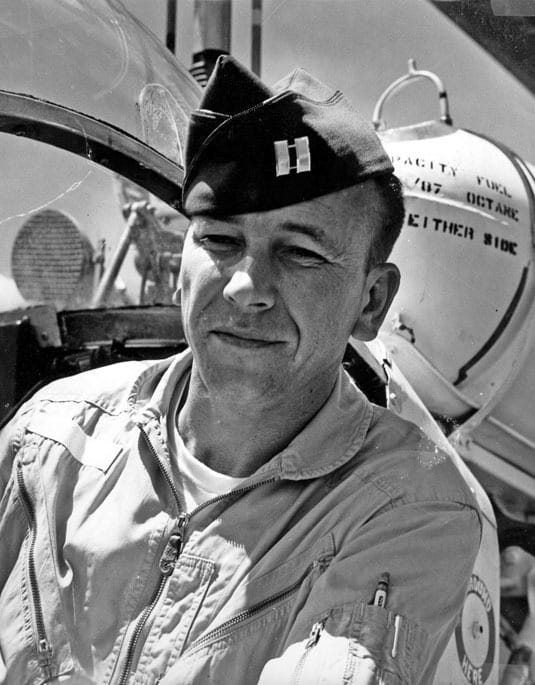
Awarded a Medal of Honor in 2001, U.S. Army Capt. Ed W. Freeman served with Company A, 229th Assault Helicopter Battalion, 1st Cavalry Division during the Vietnam War. He demonstrated selflessness and bravery when he took on solo rescue flights, unarmed, to save the lives of critically wounded soldiers.
On Nov. 14, 1965, heavy enemy fire at Landing Zone X-Ray in the Ia Drang Valley put the battalion’s 16-helicopter unit in extreme danger. Nearly defenseless and outnumbered eight to one, the medical evacuation helicopters were ordered to cease flights.
Completely unarmed, the infantry commander, who was not a MedEvac, continued delivering much needed ammunition, water and medical supplies to the besieged battalion. Braving the skies a total of 14 times, Captain Freeman rescued 30 wounded soldiers in dire need of medical attention while suffering four hits to his legs and left arm. His courageous actions that fateful day earned Captain Freeman a Medal of Honor on July 16, 2001, along with a place in history as an American war hero.
Captain Ed W. Freeman passed at age 70 on Aug. 20, 2008, in Boise, Idaho.
Week 2: Corporal Freddie Stowers
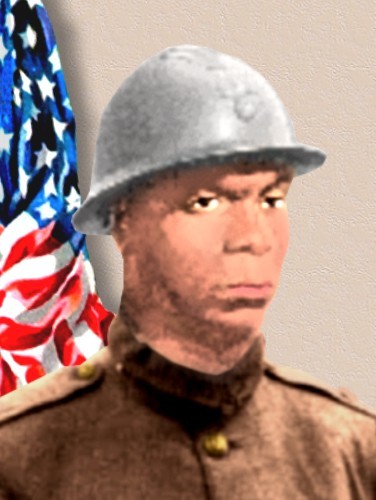
The only African American soldier to receive a Medal of Honor for his heroism in World War I, U.S. Army Corporal Freddie Stowers heroically gave his life and inspired the eventual capture of Hill 188 at Champagne Marne Sector, France. He served as a squad leader in the segregated Company C, 371st Infantry Regiment, 93d Division.
One of the only colored units allowed to sustain combat during WWI, the 93d Division was assigned to provide much needed reinforcements to the 157th French Army. On the morning of Sept. 28, 1918, Cpl. Stowers led Company C in an advance at Hill 188 near Ardeuil-et-Montfauxelles in France.
As the attack began, German troops appeared to surrender but instead opened fire when Company C emerged from their trenches. Demoralized by the killing of their commander in the surprise counterattack, Cpt. Stowers took charge and encouraged his rifle squad to take out a German machine gun nest. As they advanced toward a second line of trenches, the squad leader was mortally struck after being hit twice but continued to push his men until he succumbed to his wounds. Inspired by his heroism, Company C went on to successfully drive the Germans from Hill 188.
For his final heroic acts on the battlefield, Cpl. Stowers was recommended for a Medal of Honor by his commanding officer not long after. The recommendation was claimed lost by the board until a 1990 review uncovered institutional racism. The Army Decorations Board approved Cpl. Stowers’ overdue Medal of Honor nearly one century after he died in his moment of valor. The medal was awarded to his two surviving sisters.
“It’s been said that the ultimate measure of a man is not where he stands in moments of comfort and convenience but where he stands at times of challenge,” said President George H.W. Bush at the posthumous presentation of the Medal of Honor. “On Sept. 28, 1918, Cpl. Freddie Stowers stood poised on the edge of such a challenge and summoned his mettle and his courage.”
Cpl. Freddie Stowers was laid to rest at the Meuse-Argonne American Cemetery and Memorial.
Week 1: Petty Officer Douglas Albert Munro
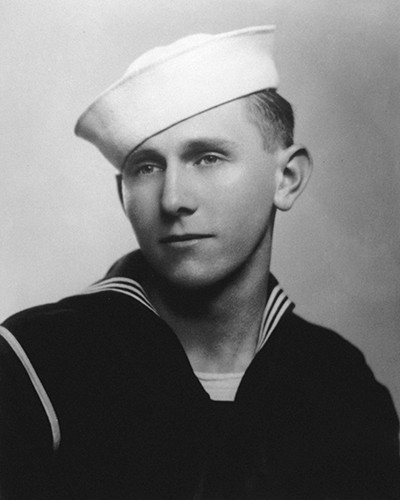
Petty Officer Douglas Albert Munro was the first and only U.S. Coast Guard member to earn a Medal of Honor. Originally from Vancouver, Canada, Officer Munro served as a signalman first class for the U.S. Coast Guard during World War II. The Medal of Honor was posthumously bestowed upon the young Canadian for his final valiant acts in organizing the successful evacuation of Marines stranded in the Solomon Islands.
On Sept. 27, 1942, the 7th Marines planned an advance to drive Japanese troops from the beach at Point Cruz Guadalcanal, where the enemy forces were building a strategically located airfield in the South Pacific.
In an unanticipated ambush, three companies landing at Point Cruz to overtake the beach were struck by a Japanese bombing raid and overwhelming gunfire. Answering the frantic call for help, Petty Officer Munro volunteered to lead a small force back to shore, positioning his own exposed craft as a barrier to provide desperately needed cover for nearly 500 Marines. As the Coast Guard was completing the withdrawal of the 7th Marines, Petty Officer Munro was struck in the base of the skull and died before reaching the operating base, just two weeks before his 23rd birthday
Petty Officer Douglas Albert Munro was posthumously awarded a Medal of Honor for nobly carrying out the Coast Guard motto of “Semper Paratus,” or “Always Ready.”
To collect all Limited Edition Hero Cards, shop at overnightprints.com between July 4 and September 4.







